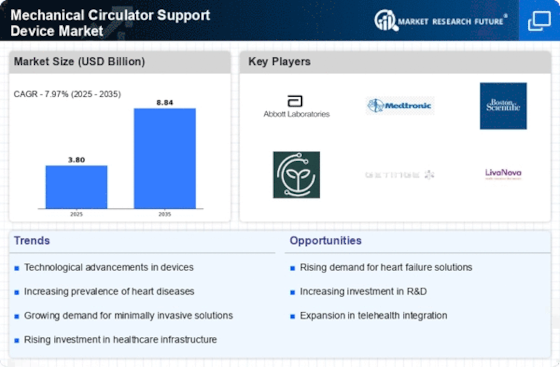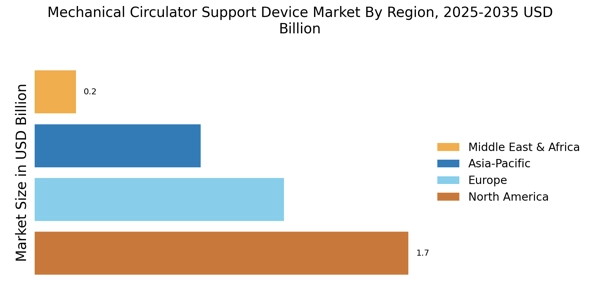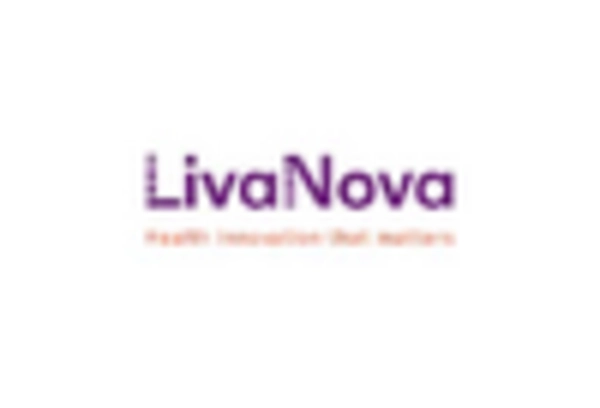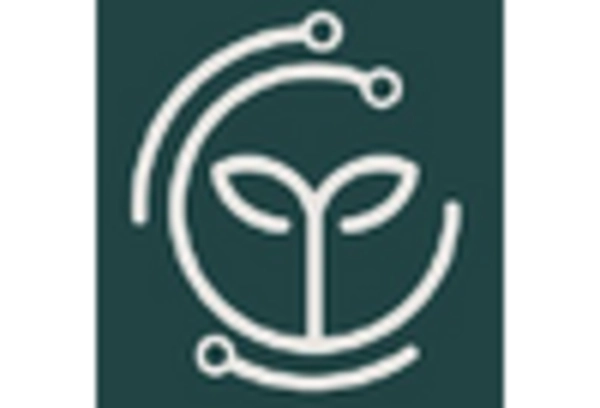Technological Innovations in Device Design
Technological advancements play a pivotal role in shaping the Mechanical Circulator Support Device Market. Innovations such as miniaturization, enhanced biocompatibility, and improved battery life are transforming device functionality and patient experience. Recent developments have led to the introduction of devices that are not only more efficient but also easier to implant and manage. For instance, the integration of wireless technology allows for remote monitoring, which enhances patient safety and compliance. As these technologies evolve, they are expected to attract more healthcare providers to adopt mechanical circulatory support devices, thereby expanding the market. The continuous investment in research and development is likely to yield further breakthroughs, solidifying the position of the Mechanical Circulator Support Device Market in the healthcare landscape.
Rising Incidence of Cardiovascular Diseases
The prevalence of cardiovascular diseases continues to escalate, driving the demand for advanced treatment options. Mechanical Circulator Support Device Market is witnessing a surge in the need for devices that can assist patients with severe heart conditions. According to recent data, cardiovascular diseases account for a substantial percentage of global mortality rates, necessitating innovative solutions. As healthcare providers seek to improve patient outcomes, the adoption of mechanical circulatory support devices is likely to increase. This trend is further supported by the aging population, which is more susceptible to heart-related ailments. Consequently, the Mechanical Circulator Support Device Market is positioned for growth as it addresses the urgent need for effective interventions in cardiovascular care.
Regulatory Support and Reimbursement Policies
Regulatory support and favorable reimbursement policies are essential drivers for the Mechanical Circulator Support Device Market. Governments and regulatory bodies are increasingly recognizing the importance of mechanical circulatory support devices in improving patient outcomes. As a result, there is a growing trend towards streamlined approval processes for new devices, which may encourage manufacturers to innovate and bring new products to market. Additionally, favorable reimbursement policies can significantly impact the adoption rates of these devices, as healthcare providers are more likely to invest in technologies that are financially supported. This regulatory environment is likely to foster a more conducive atmosphere for the growth of the Mechanical Circulator Support Device Market, ultimately benefiting patients who require advanced cardiac support.
Increasing Investment in Healthcare Infrastructure
Investment in healthcare infrastructure is a crucial factor influencing the Mechanical Circulator Support Device Market. Governments and private entities are allocating substantial resources to enhance healthcare facilities, particularly in regions with high incidences of cardiovascular diseases. This investment is likely to facilitate the acquisition of advanced medical technologies, including mechanical circulatory support devices. Enhanced infrastructure not only improves access to care but also supports the training of healthcare professionals in the use of these devices. As hospitals and clinics upgrade their facilities, the demand for innovative solutions in patient management is expected to rise. Consequently, the Mechanical Circulator Support Device Market stands to benefit from this trend, as more healthcare providers seek to implement cutting-edge technologies.
Growing Awareness and Education Among Healthcare Professionals
The increasing awareness and education regarding mechanical circulatory support devices among healthcare professionals is a significant driver for the Mechanical Circulator Support Device Market. As medical training programs incorporate advanced technologies and treatment modalities, practitioners are becoming more knowledgeable about the benefits and applications of these devices. This heightened awareness is likely to lead to more informed decision-making when it comes to patient care. Furthermore, professional organizations are actively promoting guidelines and best practices for the use of mechanical circulatory support, which may enhance the adoption rates of these devices. As healthcare professionals become more adept at utilizing these technologies, the Mechanical Circulator Support Device Market is expected to experience a positive impact on growth.

















